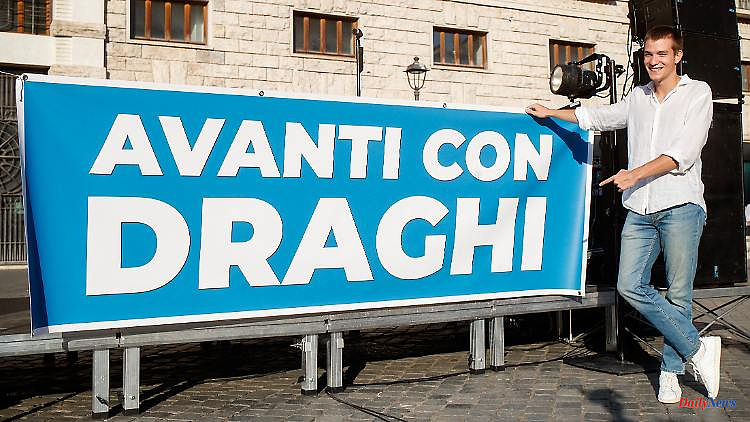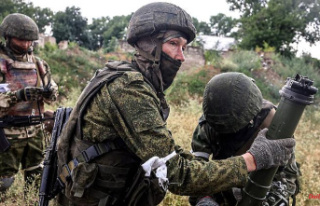As the parties continue to get lost, many Italians are trying to take their destiny into their own hands. They fear for their future if Prime Minister Draghi really resigns.
Ordinary citizens, civil society, a thousand mayors, regional presidents and even the Italian bishops' conference turn almost imploringly to the Italian Prime Minister Mario Draghi: they all ask him, no, beg him to reconsider his announced resignation. For the good of the country.
The "breach of trust," as Draghi called it in a statement, occurred last Thursday when the senators of the 5-Star Movement left the hall during the vote on an aid package, which was also a vote of confidence. However, President Sergio Mattarella rejected the resignation and urged Draghi to face Parliament and explain the reasons for his decision. Tomorrow, Wednesday at 9:30 a.m., the time has come, first in the Senate, then in the Chamber of Deputies, followed by a vote of confidence. While the procedure is normal, it should also be a last chance for the parties to pull themselves together.
Italians usually discuss football in the café, rarely politics. Now it's almost entirely about Draghi instead. Mr Luciano has voted for Berlusconi's Forza Italia party in the past, Ms Anna has always voted centre-left. They drink coffee together and discuss the "incompetence of our politicians, regardless of which party". For the first time they agree: "Draghi has to stay. Without him the country will go down the drain and the credibility he restored to us in Europe and worldwide is gone too," they say in unison.
This is not an isolated opinion, the vast majority of Italians want Draghi to stay. On Monday, solidarity rallies were held in Rome, Milan, Turin, Florence and other cities, called by a Roman student and attended by supporters from both the centre-left and centre-right. The slogan "Draghi stay!" was heard again and again.
The demonstrators are aware that not only the future of the government is at stake. The pandemic has shown the miserable state of health care. High energy prices, rising inflation, it all frightens them. 100,000 citizens have signed a petition initiated by ex-Prime Minister Matteo Renzi, head of the Italia Viva party, asking Draghi to stay. Trade unions and employers' associations are also asking Draghi not to go.
And then there are the 1,000 mayors who have signed a petition to the prime minister. Here, too, cross-party, from the left-liberal Giuseppe Sala from Milan to the right-liberal Luigi Brugnaro and Marco Bucci, mayors of Venice and Genoa respectively. The presidents of the regions of Lombardy, Veneto and Friuli-Venezia Giulia, who belong to the national-populist League, also joined the request.
In an interview, Turin's left-liberal mayor Stefano Lo Russo explained his support for Draghi with concerns for the future: "Anyone who manages a municipality or city apparently knows better [than the politicians in Rome] what Draghi's departure means for the citizens in everyday life would," he says. Lo Russo points to the horrendous energy costs and inflation, but also to the not yet defeated pandemic and the war in Ukraine. He fears that all of this will have serious consequences for the country's economic situation.
The reports from Brussels prove him right. Italy's gross domestic product is expected to grow by just 0.9 percent in 2023, which means that Italy will once again become the weakest country in the euro zone economically. Then there's the recovery plan. "We still have umpteen projects to complete by the end of the year and hand them over to Brussels in good time," emphasizes the mayor. Because without this, Brussels will not pay out the next tranche of 22 billion euros from the reconstruction fund.
The EU is also watching the political chaos in Rome with growing concern. In the meantime, people in Brussels seem to have lost faith that the parties can still save the situation. That is why they are trying to influence Draghi directly. For EU Commission Deputy President Frans Timmermans, "Draghi's contribution at this difficult historical moment is of crucial importance not only for Italy but also for the EU". Roberta Metsola, the Maltese chairwoman of the European Parliament, has also expressly spoken out in favor of Draghi's whereabouts. According to the media, a number of European governments have reported to the prime minister to persuade him.
Brussels' greatest fear is that Italy's political crisis will turn into an economic crisis that will destabilize the entire already weakened eurozone. And that at a time when nothing positive can be expected for the coming autumn and winter, starting with the concrete risk of gas shortages. The first consequences of this crisis could already be felt on Thursday, when the European Central Bank will announce and implement a 25 basis point hike in the key interest rate. For Italy, this means rising interest rates for government bonds and expensive turbulence on the financial markets.












